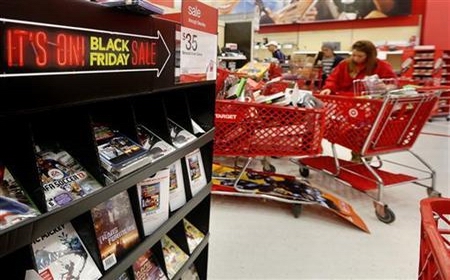
Several major U.S. retailers beat expectations of modest sales increases in December as shoppers wrapped up holiday buying, but overall results were mixed and only stores that were nimble enough thrived in an uncertain economy.
Costco Wholesale Corp (COST.O), Nordstrom Inc (JWN.N), TJX Cos Inc (TJX.N) and Ross Stores Inc (ROST.O) were among the winners of the month, while such chains as Target Corp (TGT ,N) and Family Dollar Stores Inc (FDO.N) felt the pinch as cautious consumers focused purchases on food and other basics.
Across 17 retailers including discounters, department stores and apparel chains, December sales at stores open at least a year rose 4.5 percent, topping analysts' estimates for 3.3 percent growth. The result reported Thursday also topped 1.6 percent growth in November 2012 and a 4.2 percent increase in December 2011, according to Thomson Reuters I/B/E/S.
Companies like Costco, TJX and Ross "are able to thrive in whatever economic environment they happen to be operating in" by adjusting their business models, inventory levels and sales strategies better than many peers, said Craig Johnson, president of Customer Growth Partners.
The stronger-than-expected December is likely to help retailers overcome a softer start to the key holiday season. The 2012 season was never expected to be stellar, but even the single-digit growth anticipated by chains and analysts came under pressure as Superstorm Sandy, the ever-present headlines about the "fiscal cliff" and the Connecticut school shootings affected consumers' moods in November and December.
With the number of chains that report monthly sales dwindling in recent years, Thursday's tally offered a limited snapshot of consumer behavior. Industry heavyweights like Wal-Mart Stores Inc (WMT.N) and sector leaders like consumer electronics chain Best Buy Co Inc (BBY.N) have yet to report sales for the holiday season.
Retail stocks, which largely missed out on Wednesday's market rally, rose on Thursday. The S&P 500 retail index .SPXRT added nearly 1 percent near midday, while the S&P 500 index .SPX inched up 0.1 percent.
CONSUMER CONFIDENCE
With the country moving past the fiscal cliff debate, retailers will be watching whether the expiration of the payroll tax cut takes a toll on consumer spending.
The expiration of the payroll tax holiday, which this week raises Social Security taxes for workers to 6.2 percent from 4.2 percent, may be more important to the economy than the income tax hike for wealthy people, said Michael Wilson, head of research at Morgan Stanley's wealth management division.
"A two percent hit off the top for the average person is meaningful," he said. "It will change their spending behavior."
While it was hard to say American consumers were tapped out, they are "fragile," said Chris Donnelly, global head of Accenture's retail practice. "It doesn't take much to rattle the consumer."
As cautious U.S. consumers try to stick to their budgets, it remains a very competitive marketplace for retailers, Donnelly said.
Madison Riley, managing director of retail consulting firm Kurt Salmon, predicted that if the upcoming debt ceiling debate goes better than the Washington wrangling to avoid the cliff, there could be a bigger uptick in consumer spending in 2013.
HO-HUM SPRING
As retailers finish up their quarter this month, they are bringing out fresh merchandise while offering deep discounts to move winter goods.
Michael Niemira, chief economist of the International Council of Shopping Centers, sees a ho-hum spring selling season. He expects sales growth in the 2013 spring season to be weaker than in 2012.
Higher food prices this year mean "a little less discretionary spending power" for U.S. shoppers, he said.
One bright spot this spring could be home goods. Home improvement chains such as Home Depot Inc (HD.N) and Lowe's Cos Inc (LOW.N) and retailers selling home goods and furnishings could benefit as people start to update their homes with the turn in the housing market, said Customer Growth's Johnson.
HITS AND MISSES
TJX and Ross, which appeal to bargain hunters with marked-down name-brand merchandise, posted stronger-than-expected sales and raised their fourth-quarter earnings forecasts.
But at Barnes & Noble Inc (BKS.N), holiday sales fell sharply, with a decline in the number of Nook devices sold and shoppers at its stores.
Kohl's Corp (KSS.N“ ) slashed its fourth-quarter profit outlook, as holiday sales came late in the season at deeper discounts than planned. Still, its 3.4 percent rise in December same-store sales topped forecasts.
Gap Inc's (GPS.N) December same-store sales topped expectations. The retailer also said it would buy women's luxury retailer Intermix.
Target's same-store sales were essentially flat, while analysts anticipated a 0.8 percent increase. Target said fourth-quarter earnings should meet or somewhat exceed the low end of its forecast, but the warning was not as dire as some may have anticipated, and its shares were up 2.3 percent.
Limited Brands Inc (LTD.N) sales rose less than anticipated, marking a rare miss for the owner of the Victoria's Secret chain. Limited said its merchandise profit margin came in below its own forecast. Its shares fell 5.4 percent.
Wet Seal Inc (WTSLA.O) expects a fourth-quarter loss at or near the bottom of its prior forecast after December same-store sales fell 9.7 percent, the steepest decline among the 17 chains. Its shares were flat.
Family Dollar's same-store sales rose about 2.5 percent in December after increasing 6.6 percent in the preceding quarter. Its shares slid 11 percent.
"The holiday selling season proved to be more challenging than we expected as customers faced increasing financial uncertainty," said Family Dollar Chairman and CEO Howard Levine.





